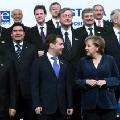
On 1 and 2 December, a major Summit of the Organisation of Security and Cooperation in Europe (OSCE) was held in Astana the capital city of Kazakhstan.
Some forty very senior international political representatives including many Heads of State attended this event, which at its heart was characterised by a massive hypocrisy.
The OSCE was founded in 1975 and comprises 56 member states from Europe and North America, the Caucasus and Central Asia. While established as a security oriented intergovernmental organisation, the OSCE makes strong claims to be a champion of freedom, human rights and democracy. A document agreed at the Copenhagen meeting of the Conference on the Human Dimension of the OSCE in June 1990, lays out the basic principles that member states are expected to adhere to.
The Document states, “The participating States express their conviction that the protection and promotion of human rights and fundamental freedoms is one of the basic purposes of government… They reaffirm that democracy is an inherent element of the rule of law. They recognise the importance of pluralism with regard to political organisations.”
In September, I recounted here our experiences on a delegation to Kazakhstan where we heard testimony from social and political activists, human rights groups and independent trade unions of the widespread crushing of civil and political rights. Worker activists told us of persecution when they organised for justice in the workplace. Journalists and other media workers told us of persistent harassment from agents of the state to prevent them from publishing news and views independent of the government. Many had spent time in prison for simply mounting peaceful protests or public rallies.
In particular, we took chilling evidence from recently released prisoners. Extreme, systematic beatings were a constant fact of life for some prisoners. Prisoners described a metre long strip of dense rubber which was used to beat them and was nicknamed “the camera” because the viciousness of the sting when they were beaten with it made their eyes flash! Violent male rape and degrading humiliations were also used as weapons of extreme coercion.
So horrific had the torture become in the prisons that in August prisoners mutilated themselves by cutting their stomachs in protest.
This litany or repression and denial of political and human rights is deployed by the Kazakhstan government to prevent any revolt against the rule of the Kazakh elite headed by Nursultan Nazarbayev, who has been president for the last nineteen years. He made the transition from being a boss in the Stalinist regime that dominated Kazakhstan up to 1990 to being a mega-rich owner of wealth and has also enriched his family courtesy of the resources of the Kazakh people.
That Kazakhstan was awarded the prestige of the rotating chair of the OSCE and then a summit in Astana was bad enough. But the fawning of Western leaders on Nazarbyev at that summit was particularly revolting. While there were soft, ritual statements about the importance of human rights, not one word of direct criticism of Kazakhstan’s brutal suppression of human rights and political and media freedom was uttered by the leaders who addressed the Summit.
Chancellor Merkel of Germany spoke of the OSCE being committed to “an era of democracy, peace and unity.” She continued, “Human rights, freedom, legal security, basic democratic rights economic growth and security are the tasks that we have to accomplish.” But rather than opening up a broadside on how the opposite was being done by the government of Kazakhstan, Frau Merkel went on to flatter her hosts. Addressing directly a man guilty of presiding over a regime of repression and torture she said, “I should like to thank the Kazakh President, Nursultan Nazarbayev, for the hospitality and warm welcome.”
Herman Von Rompuy, President of the Europeam Union Coumcil also thanked Nazarbayev “for his warm and generous hospitality.” Not one of them used their position or public statements to tell the horrifying truth about the brutality of the regime they came to honour.
On October 26, when President Nazarbayev visited Brussels, EU Commission President Barosso unwittingly demonstrated the reason for the great self proclaimed champions of democracy in the European Union fawning on this repressive monster when he said, “Kazakhstan and the EU share an interest in the diversification of energy routes and an open investment climate. This is a win-win partnership! I know how strongly President Nazarbayev is personally committed to this very important trade and investment partnership.”
Kazakhstan is enormously rich in oil, gas and many rare minerals which western industrialists are desperate to get their hands on. In pursuit of these natural resources leading EU representatives who are usually loudly proclaiming their devotion to democratic rights fall shamefully silent. We, however, must shout all the louder in their stead.

Be the first to comment